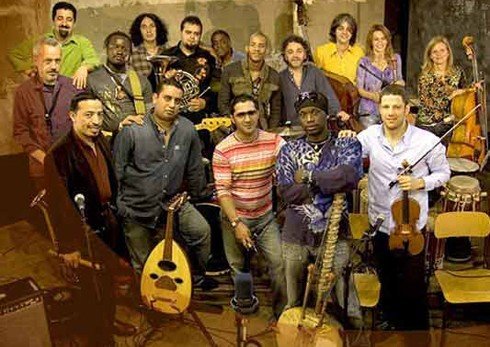Alin is a 17-year-old youngster. He has been living in Ostia, in Rome's outskirts for four years. He has a crabby character with his teachers and his friends. This hides a deep need to be accepted and his difficulty to adapt his Romanian belonging to the Italian context.
Masha is 18 years old. She was born in Belarus and was adopted by an Italian family. For a long time, she has not had any news of her brother who finally managed to find her. She would like to hold him in her arms again even if she is afraid to open up again the painful wounds of the past.
Nadar's parents are Egyptian and have been living in Italy for twenty years. He was born here sixteen years ago and he faces the conflicts of adolescence and confronts his family's cultural traditions.
Fratelli d'Italia (Brothers of Italy, 90', Italy, 2009), of the filmmaker Claudio Giovannesi is a three-episode documentary that narrates, through three stories, the hazardous integration trajectories that young people of foreign descent have to face to live in Italy. He invites us to a deeper reflection striving us to better understand the life of this second generation to whom citizen rights are still denied. In Italy, there are 862 000 youngsters born of foreign parents. 457 000 were born in our country and the others arrived at an early age due to a family settlement.
They are Italian and they feel so but they are still considered as "foreigners" from a social and a legal point of view since they are children of immigrants. The access to citizenship, a necessary condition to have the same rights as the children of Italian parents, is made up of a long, torturous and often aporetic administrative procedure.
"I shot this film because I think that Italy still does not manage to recognize its multicultural identity. She hides behind an illusion of national pride and refuses the positive value of diversity", explains the young documentary maker. "I believe that every form of melting pot is fundamental and moving. The so called immigrant population in reality is our new social fabric, a richness that should be welcomed with its complexity and its never-ending contradictions", he pursues.
"Fratelli d'Italia" is the result of two years of work in collaboration with the technical-commercial Institute Paolo Toscanelli of Ostia in the Roman suburbs where nearly 30% of the students are of foreign descent. "I chose three adolescents to be the protagonists, to tell their everyday life while observing their interpersonal relationships and the conflicts that torment them", states Giovannesi.
The school is the emblem of this sinuous integration trajectory where the teachers do not always succeed to guarantee the students with a satisfying training. The latter are increasingly becoming victims of the false needs imposed by mass consumption. In an ambiguous and sometimes violent environment, the overwhelming individual growth is confronted by the demand of divisive standards provided by the religious and cultural traditions of the communities of origin.
This is the case of Nader: Egyptian blood and a very Italian life style. Like a lot of youngsters of his own age, this bright-eyed boy dreams to become a professional footballer, he loves girls (he has an Italian girlfriend, against his parents' will) and at school he is such a rebel that he managed to be suspended before a forecasted year repeating.
"The generation conflict in the film refers to the theme of identity. The difference that separates fathers and sons is at the origin of the problems faced by the first and second generation immigrants" comments Giovannesi. "I have tried to consider the concept of integration beyond its utopian abstraction, by dealing with it in the heart of reality", pursues the filmmaker. "I realised that integration is not possible even when strongly desired: it's a never-ending trajectory requiring a complex and responsible redefinition of identity from the two parties - the newcomers and those who host them - in an equal way.
Alin, Masha and Nader live the joys and conflicts of a "bridge generation" between different cultures resulting from a deep social change characterising contemporary Italy.
"In the beginning this was not easy at all: I wasn't used to be followed by four technicians from morning till evening", tells us Masha, protagonist of the second episode. "They accompanied me everywhere, carrying bulky equipment: at school, at home and when I met my boyfriend. With time, the camera became a friend, always by my side, a friend with whom I could share my emotion and my fears". And she adds: "it was a beautiful experience and I hope that this film could help young people, parents and teachers. I suggest that everyone should watch it because very often, people judge immigrants unknowingly, without knowing anything about their lives, the difficulties they are obliged to overcome".
The documentary won the special jury mention at the "Roma Film Festival 2009" at the Other cinema section / "for an amazing, captivating and heartfelt look with which the documentary enters the lives of three teenage Italian adolescents, sons of immigrants".(ÇT)





